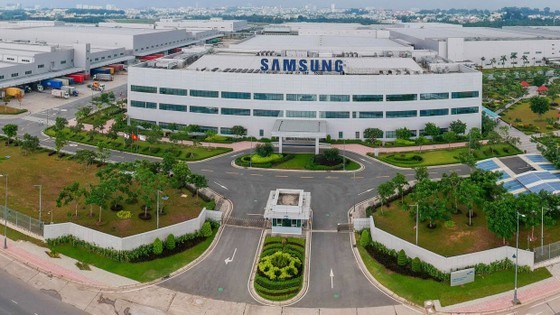 |
An FDI company in Saigon Hi-tech Park. (Photo: SGGP) |
At the forum, aiming at discussing possible impacts on the investment environment, Vice Chairman of Vietnam International Arbitration Center Tran Du Lich stated that tax and land price are two major tools for Vietnam to attract foreign investments, be it new or additional ones.
The country has adopted various preferential tax policies in the past few years like ‘Exempt 4 – Reduce 9’ (tax exemption in 4 years and reduction in 9 years), preferential treatment for 23 special fields, lower tax rate for 7 fields, incentives in industrial parks, economic zones, hi-tech parks.
Preliminary estimations show that the actual tax rate for FDI businesses in Vietnam is 12.3 percent, lower than the global minimum one (at 15 percent). Certain giant corporations can even enjoy a tax rate of 2.75-5.95 percent. However, once the global minimum tax policy of 15 percent is widely applied, the preferential tax policy no longer becomes attractive to international companies.
Like it or not, Vietnam has to join in the game. If the tax rate for FDI enterprises in Vietnam is lower than 15 percent, these companies have to submit the remaining difference to the country where their headquarters are sited. This means Vietnam’s sacrifice to give incentives to investors will bring benefits to other nations, which is not at all sensible, said Phan Duc Hieu – member of the Economics Committee of the National Assembly.
Experts in the field commented that this global minimum tax policy affects large FDI businesses with a worldwide revenue of over €750 million as well as small-scale projects since these might be a part of a global trading network of a company.
Deputy General Director of Deloitte Vietnam Phan Vu Hoang stated that the quality of investment environment is much more important than provided incentives. Therefore, attracting foreign investments via improvements in infrastructure, transparency in administrative procedures is wiser. This indicates that Vietnam should collect taxes properly and improve the business environment. Meanwhile, it is possible to raise the deduction of such costs as research and development, green infrastructure, human resources training.
Agreeing with that, Tran Do Le Uyen from BR Law Firm, who has much experience working with foreign investors, the transparency of tax policies is more important than the referential rate. To offer more incentives to businesses, it is possible to increase deductible expenses when calculating corporate income tax, lowering the tax amount payable.
Tran Viet Ha, Deputy Head of HCMC Export Processing and Industrial Zones Authority (Hepza), said that besides incentives in corporate income tax, Vietnam, particularly HCMC, adopts preferential policies for import-export tax, land use fees, and depreciation charges. He also stressed the need to fully improve the business and investment environments so that investors encounter no law-related trouble.
Phan Duc Hieu added that Vietnam now implements 7 policies to support investors, and these legal documents should be strictly observed to compensate for a loss in tax preference. The advantage of this method is the ability to apply immediately without any need to amend legal documents, which usually takes much time.
The global minimum tax will be formally implemented in 2024, and there is little time for Vietnam to adapt to maintain its attraction to foreign investors. Therefore, instead of only focusing on using preferential tax policies, it is wiser now for HCMC to establish a fair environment where matters like human resources training, infrastructure upgrades, business and investment environment improvements, green growth strategies earn more proper attention.
In 2017, Vietnam joined in the global action plan to fight against tax base erosion and profit shifting (BEPS Actions) with other 141 members. Accordingly, from 2024, multi-national corporations with a worldwide revenue of over €750 million are subject to a global minimum tax rate of 15 percent. If an enterprise enjoys a lower tax rate at the invested country, it has to pay the remaining difference for the country where its headquarter is located.
























